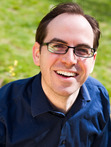Adam Szymkowicz's Blog, page 58
March 20, 2015
I Interview Playwrights Part 729: Antony Raymond
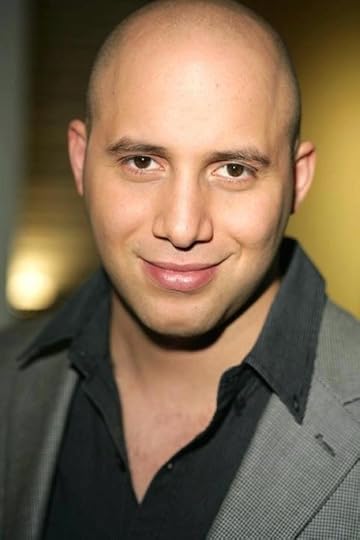
Antony Raymond
Hometown: New York, NY
Current Town: New York, NY
Q: Tell me about Pretty Babies.
A: PRETTY BABIES is a play that deals with toxic relationships. I enjoy writing about relationships in general and what attracts us to the ones we choose. This play is all about choosing the wrong ones, I guess.
Q: What else are you working on now?
A: I'm working on a satire a some of the Shakespeare romances wrapped into one. Its called NOTHING TO DO ABOUT EVERYTHING OR WHATEVER. Its written all in verse. Iambic pentameter. Its going to be wild. Lots of love triangles. That sort of thing.
Q: Tell me, if you will, a story from your childhood that explains who you are as a writer or as a person.
A: I will say this: I remember really wanting people to like me. I remember Robin Williams saying that once. How he developed as an artist. That it came from a profound place of insecurity in a lot of ways. But, the good news is that the insecurity goes away eventually (with some work) and you're left with some tools you can really play with.
Q: If you could change one thing about theater, what would it be?
A: Less TV stars with no training and no business doing it and more raw talent, more unknowns, unheard-ofs. Casting directors who actually work to get it right instead of playing it safe. Casting directors with guts and innovative ideas.
Q: Who are or were your theatrical heroes?
A: Ivo Van Hove, Austin Pendleton, Reed Birney. The actors in my theater company.
Q: What kind of theater excites you?
A: Gutsy theater that raises questions and pushes boundaries. And I love a good dance number too.
Q: What advice do you have for playwrights just starting out?
A: Just keep writing. Don't worry about the finished product. You'll get there before you know it. As long as you commit to the doing of it.
-----------------------------------------------------------------------------------------------------------
Enter Your Email To Have New Blog Posts Sent To You
-------------------------------------------------------------------------------------------------------------
Support The Blog

-------------------------------------------------------------------------------------------------------------
Mailing list to be invited to Adam's events
Email:
--------------------------------------------------------------------------------------------------------------
Books by Adam (Amazon)
Adam's New Play Exchange Profile (Plays to Read)






Published on March 20, 2015 09:00
March 19, 2015
NOW PUBLISHED

Playscripts just published my collection of short plays
7 Ways to Say I Love You
"This collection of funny, sweet, silly, poignant and
stylistically diverse short plays from New York favorite Adam Szymkowicz
has something for everyone. From the awkwardness of asking out a pizza
store clerk (Ambience Pizza), to a campy infidelity revenge comedy (Film Noir), to the couple destined to be together no matter the obstacles (John and April), this collection explores heart, grief, pain, and humor as the plays dance around the eternal human theme of love."
To read samples of the plays, follow the links below. Or just, you know, buy a copy.
Ambience Pizza
Film Noir
Mind of the Critic
Moneypenny Waits
The Moment
Smashing Eyes and Little Folded Hands
John and April
https://www.playscripts.com/play/2734
-----------------------------------------------------------------------------------------------------------
Enter Your Email To Have New Blog Posts Sent To You
-------------------------------------------------------------------------------------------------------------
Support The Blog

-------------------------------------------------------------------------------------------------------------
Mailing list to be invited to Adam's events
Email:
--------------------------------------------------------------------------------------------------------------
Books by Adam (Amazon)
Adam's New Play Exchange Profile (Plays to Read)






Published on March 19, 2015 16:43
I Interview Playwrights Part 728: Ed Falco
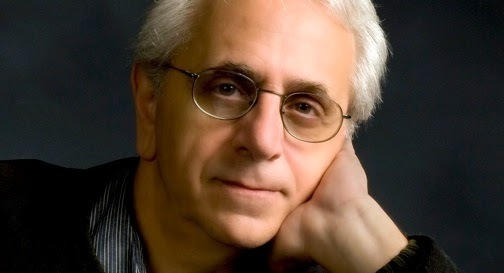
Ed Falco
Hometown: Brooklyn, NY
Current Town: Blacksburg, VA
Q: Tell me about Possum Dreams.
A: Possum Dreams is a seriously funny play about a married couple caught in the unraveling illusions that have held them together for eighteen years. The play opens with Walter coming home from teaching, distressed because a transsexual student has been flirting with him. It's a revelation that leads to an intense yet often hysterical battle that reveals the chaos under the surface of the carefully ordered lives of Walter and his wife Jan.
I live Blacksburg, Virginia, where I teach in the MFA program at Virginia Tech; and I’ve written a number of plays that have been read and produced locally. For the most part, I’ve satisfied myself with being part of our local theater community, and I haven’t tried very hard to find productions for my plays elsewhere—except for Possum Dream, which I’ve always felt was a very funny play that could successfully reach a wider audience. It’s taken a long time and a lot of work, but finally, with the intervention of Emily Rubin (a former student of mine who is now working as an agent and manager) Possum Dreams is finally reaching a larger audience, first through a production in Akron, Ohio by None Too Fragile; and later in a short New York run at Theatre 54 in New York.
Q: What else are you working on now?
A: I’m some 50,000 words into a new novel; I’m gathering actors locally for a staged reading of a recent play, with hopes of a local production next year; and I’m about to start a rewrite of The Miscreant, my most recent play.
Q: Tell me, if you will, a story from your childhood that explains who you are as a writer or as a person.
A: I have a twin sister, and the story goes that when my mother told my father that the doctor said she was carrying twins, he shouted: “Did you tell him we already had three children!” That’s an amusing little bit of family lore from my embryonic days, but it says a lot about how I turned out. My father was a house painter who had to struggle those days to support his wife and three children; then, unplanned, he found he had two more on the way. The youngest of five children, there was always a lot of pressure on me to be silent and stay out of the way. Writing and storytelling is the way I eventually found I could be heard.
Q: If you could change one thing about theater, what would it be?
A: I would change the culture in the theater community that says it’s permissible to simply ignore plays that have been submitted to your theater or your company. I understand that it’s sometimes impossible to read the hundreds of plays submitted to a successful theater company—but it shouldn’t be okay to simply ignore submissions. Compose a form rejection for the plays you’ve actually read and don’t want to produce, and get it back to the author. Compose a form apology for the plays you can’t read because you’re overwhelmed with submissions: “Staff constraints have made it impossible for us to read all the plays submitted to our theater and thus we are returning this play to you unread, with our sincere apologies.” Send the author something, anything—but don’t do what so many theaters do and simply ignore the submission before eventually tossing the play. It feels deeply disrespectful to playwrights.
Q: Who are or were your theatrical heroes?
A: Mamet, Pinter, and Shepard are the playwrights I read early and had the most influence over my writing, but my real heroes are all the small theater companies everywhere that persevere in producing and promoting plays while living in a world less and less interested in all serious art, including theater.
Q: What kind of theater excites you?
A: Any theater that is rooted in good writing and good acting. If you throw in good production values, I’m thrilled—but they’re not as essential as good writing and good acting. Give me a good play and good actors, and I’ll come to your living room to see the show and be excited to be there.
Q: What advice do you have for playwrights just starting out?
A: Move to a city with a vibrant theater community; participate in the community any way you can—become part of the community; see as many plays as you can; read as many plays as you can; then write and keep writing, every day if at all possible. Talent is important, but perseverance and a commitment to writing are the truly essential elements of a successful life as a writer.
Q: Plugs, please:
A: Possum Dreams is showing at Shetler Studios Theatre 54, 244 W 54th Street #12, from March 18 – March 28. Buy tickets here: http://bit.ly/1FwQMT0 Or pay what you can at the door.
-----------------------------------------------------------------------------------------------------------
Enter Your Email To Have New Blog Posts Sent To You
-------------------------------------------------------------------------------------------------------------
Support The Blog

-------------------------------------------------------------------------------------------------------------
Mailing list to be invited to Adam's events
Email:
--------------------------------------------------------------------------------------------------------------
Books by Adam (Amazon)
Adam's New Play Exchange Profile (Plays to Read)






Published on March 19, 2015 09:00
March 18, 2015
I Interview Playwrights Part 727: Lia Romeo

Lia Romeo
Hometown: Boulder, CO
Current Town: Hoboken, NJ
Q: What are you working on now?
A: I’m currently writing a play in a month for The Brooklyn Generator. The Generator selects six playwrights every season, and each playwright is assigned to one month, during which they have to complete a draft of a full-length play. My play is called The Grand Tour, and it’s about travel and family dynamics and interracial adoption and a marriage that’s falling apart. It’s actually turning out to be a lot easier than I expected to write on such a tight deadline, because I’m able to just focus and completely immerse myself in it.
The other great thing about the Generator is that they start off each playwright’s month with a “generation meeting,” where the playwright meets with their cast and director and the other playwrights involved that season, and can ask everyone questions or lead a discussion about the themes of the play they’re planning to write. I want to get friends together and do this every time I write a play – I got some amazing stories and insights from the people at my meeting, and they’re finding their way into the script.
Q: Tell me about Project Y.
A: Project Y is a wonderful company here in NYC that’s dedicated to New York and world premieres of new works. I’ve worked with Project Y as a playwright quite a bit – they produced one of my plays at 59E59 a couple of years ago, and have also done readings and workshops of others – and last year I started working as the literary manager. We do a reading series with a specific theme each year (this year’s is Parity Plays – focusing on women playwrights, and plays with casts that are more than 50% female), and also do workshops, new play festivals, and full productions. We also founded the Project Y Playwrights Group in 2014 – it’s a selective playwrights’ workshop that meets every two weeks to read and discuss members’ work. It’s a really smart and talented group of writers, and it’s been so much fun to work with them.
Q: Tell me, if you will, a story from your childhood that explains who you are as a writer or as a person.
A: I was a strange child. When I was about four, I remember sitting under my parents’ kitchen table and suddenly realizing that I was going to die someday – and getting really upset about it. I was pretty terrified of mortality throughout my childhood, and I developed a focus on death that showed up in my writing – I wrote a lot of poems about dead flowers, and spent a lot of time wandering around in the cemetery near my parents’ house. Apparently my grandfather got worried about me at one point, and asked my mom if she thought I was depressed, and my mom was like no, she’s actually really happy, she just thinks about death a lot. That’s still a pretty good description of who I am as an adult and as a writer.
Q: If you could change one thing about theater, what would it be?
A: I wish it were easier or there were a more obvious way to make a living in it. When I was getting out of college, and my friends were going off to work at law firms or PR firms or investment banking firms, I found myself desperately wishing that there were “playwriting firms” where you could just apply and get hired and paid a living wage to write a few plays every year, and then the firms would send your plays out to theaters. There are so many different career paths as a playwright, and in a way that’s great, but it’s also a very difficult thing – especially since most of them don’t actually pay any money.
Q: Who are or were your theatrical heroes?
A: People who are just out there doing it – and doing it really well – despite how hard and frustrating and thankless it can sometimes be. People who recognize that it’s still pretty much the best thing ever.
Q: What kind of theater excites you?
A: Plays about the ways that people actually think and feel and talk. So much theater feels like it isn’t about real people, it’s about “stage people,” stylized versions of people that don’t bear a lot of resemblance to reality. It’s not that I only like realistic plays – many of my favorite plays aren’t – but I like plays about real – even if not necessarily realistic – people.
Q: What advice do you have for playwrights just starting out?
A: Get out there and get involved with the theatrical community. I spent a lot of years not doing that – just sitting at home writing plays and sending them off to theaters, but not going out and meeting people and getting to know theater companies – and I think I wasted a lot of time. So much of theater is about networking and meeting people – which can be hard for introverted writer types, but it’s really important. I think it's really helpful for writers to read scripts or do literary management work – I actually just wrote a piece for HowlRound about this – and that can be a great way to get involved with a theater company.
Also, find a good day job. You’re going to be making a living from something other than writing for a long time, maybe forever, and it’s a lot easier to be patient and stick with it if the thing that pays you money is something you don’t mind doing.
Q: Plugs, please:
A: The Brooklyn Generator reading of my play The Grand Tour is Sunday, March 29 at 4:30 pm at Brother Jimmy’s Union Square. I’ve also got a few productions coming up next season… not all of them are public yet, but here’s one that is: Forward Flux Productions will be producing my play Green Whales in Seattle September 16-October 3, in repertory with Still Life, a wonderful play by Barbara Blumenthal-Ehrlich.
Also, Project Y is kicking off the Parity Plays reading series in April with plays by Hilary Bettis (The Ghosts of Lote Bravo) and Allyson Currin (The Sooner Child).
-----------------------------------------------------------------------------------------------------------
Enter Your Email To Have New Blog Posts Sent To You
-------------------------------------------------------------------------------------------------------------
Support The Blog

-------------------------------------------------------------------------------------------------------------
Mailing list to be invited to Adam's events
Email:
--------------------------------------------------------------------------------------------------------------
Books by Adam (Amazon)
Adam's New Play Exchange Profile (Plays to Read)






Published on March 18, 2015 09:00
March 17, 2015
UPCOMING!!!! !
UPCOMING EVENT:
Book Signing at Drama Book Shop in New York!
March 27
Scenes from plays by Crystal Skillman, Qui Nguyen and me. You should come.
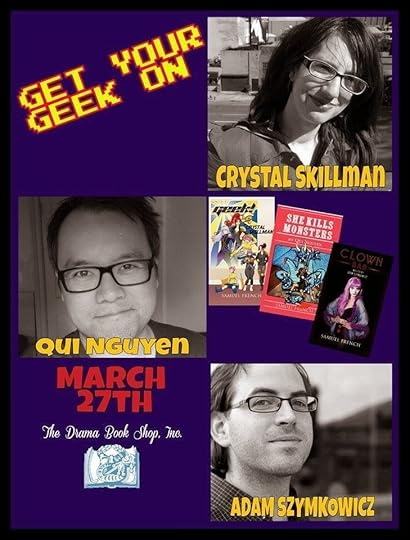
More information here
UPCOMING PRODUCTIONS of My Plays--
Clown Bar
Production #5 of Clown Bar
Indiana Players
Indiana, PA
Opens March 20, 2015
Hearts Like Fists
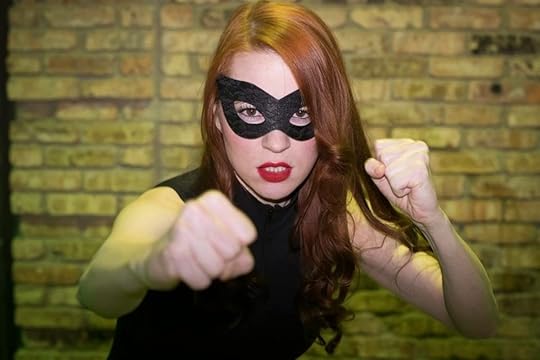
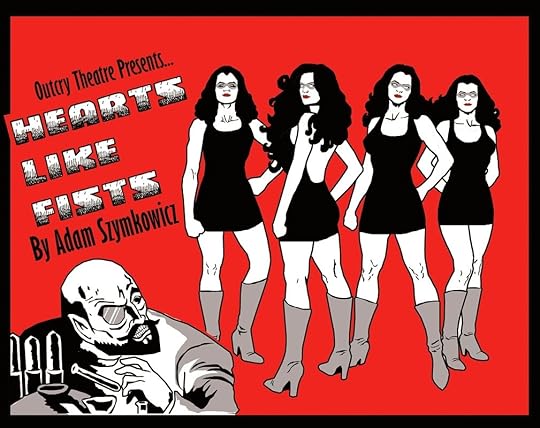
Production #13 of Hearts Like Fists
Outcry Theatre
Dallas, TX
Opens March 19, 2015
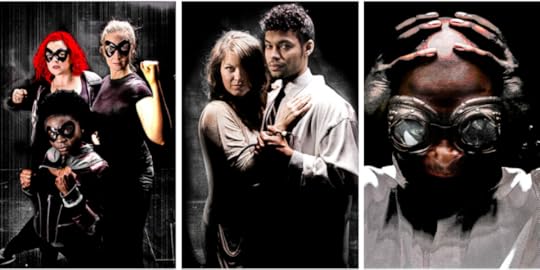
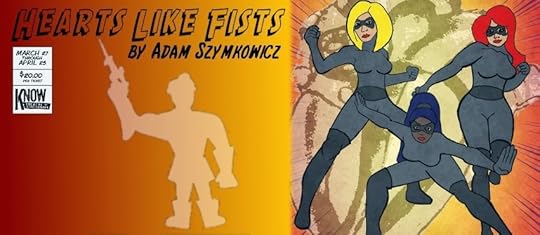
Production #14
Know Theatre of Cincinnati
Cincinnati, OH
Opens March 27, 2015
Production #15
Stephens College
Columbia, MO
Opens April 9, 2015
Production #16
Clark University
Worcester, MA
Opens April 15, 2015
Pretty Theft
Production #9
Western Illinois University
Macomb, IL
Opens May 10, 2015
Production #10
James Madison University
Harrisonburg, VA
Opens April 26, 2016
Adventures Of Super Margaret
Production #1
Oddfellows Playhouse
Middletown, CT
Opens May 28, 2015.
Nerve
Production #17 of Nerve
DePaul University
Chicago, IL
Opens June 5, 2015
New Play (TBD)
Workshop production
Chance Theater
Anaheim, CA
August 19, 22, 23
-----------------------------------------------------------------------------------------------------------
Enter Your Email To Have New Blog Posts Sent To You
-------------------------------------------------------------------------------------------------------------
Support The Blog

-------------------------------------------------------------------------------------------------------------
Mailing list to be invited to Adam's events
Email:
--------------------------------------------------------------------------------------------------------------
Books by Adam (Amazon)
Adam's New Play Exchange Profile (Plays to Read)






Published on March 17, 2015 09:00
I Interview Playwrights Part 726: Barry Rowell
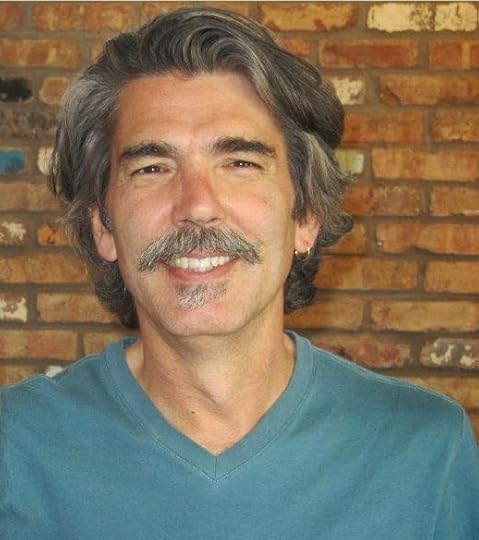
Barry Rowell
Hometown: Fort Worth, TX
Current Town: New York, NY
Q: Tell me about Floydada.
A: Floydada is something I wrote for Catherine Porter and Nomi Tichman, two of my favorite actors. It’s about two sisters in 1926 Texas: one of them left home a couple of decades before and has traveled the world while the other stayed home and took care of their parents and managed the family’s dry goods business. Out in the world, Dalia (Nomi) has lived in big cities and encountered the Dada art movement. A terminal illness has forced her to return home so that she can be cared for by Ada (Catherine). But she doesn’t want to just sit around and wait to die so she convinces Ada to start a Dada cabaret in their store.
Q: What else are you working on right now?
A: Actively, I’m planning a site-specific play about bar life to be performed in bars; we’ll start workshopping that again in the late spring and summer, I hope. I’ve also got a few projects that we (Peculiar Works) have already produced that I want to go back and develop further: Manna-Hata from 2013,; a play about the militant separatists movement in the U.S. that we presented in 1996; and a multi-artist event adapted from the novel, Don Quixote—we’d really like to do that one in Spain next year. There are others that are just ideas but those are the most concrete…
Q: Tell me, if you will, a story from your childhood that explains who you are as a writer or as a person.
A: My dad likes to remind me of the time that I came home and told my parents that I gotten a job mopping the floors at a local diner on Saturday afternoons. I was in middle school so probably about 12 or so. At the time, he couldn’t imagine what had possessed me to go and ask about the job but it wasn’t really all that surprising: my dad had often talked about having to work when he was a kid—growing up in West Texas in the ‘40s, he had to pick cotton—and I figured that I was supposed to find some work, too. I don’t remember how long I had the job—a few months, maybe—before the café closed (or maybe I got bored and quit before that… I really don’t remember). But I think that sort of impulsiveness continues to be one part of who I am. Not always, of course, but often: when I moved to New York, when I started writing plays, several of the projects we’ve done over the years.
Q: If you could change one thing about theater, what would it be?
A: Movies adapted into musicals would be abolished and the composers would not be allowed to write those McMusical Ballads. The stifling of imagination is my biggest complaint about commercial theater—especially since I know so many incredible writers, directors, composers, actors and designers working for no money with no money and accomplishing extraordinary things.
Q: Who are or were your theatrical heroes?
A: There are hundreds. As a writer, I probably hear Harold Pinter in my head more than anyone else—I wish I had his way with silence. But I’m also a big fan of more poetic, image-filled writing. Catherine and I did a workshop with The Drama League in Bulgaria last summer and Gabriel Shanks recommended we bring the Bulgarian directors work by 20th century American writers whose work is in that vein, and they’re some of my favorite authors: Gertrude Stein, Richard Foreman, Charles L. Mee, Mac Wellman and Ruth Margraff. If I had the ability, I would be writing like that… but that’s just not how I hear language. I also love directors like Elizabeth LeCompte and Emma Rice, and companies like Kneehigh Theatre (probably my all-time favorite) and Rude Mechanicals in Austin. If there is reincarnation, I want to be a choreographer in the next life: I love David Parker/The Bang Group, Yanira Castro and Monica Bill Barnes (and lots and lots of others).
Q: What kind of theater excites you?
A: Imaginative—show me something I haven’t seen a hundred times before. I don’t mean plots: I mean creativity. The best productions I’ve seen in recent years were full of surprises. Rude Mechs’ Method Gun—blew me away; Kneehigh’s The Bacchae (and almost every show of theirs I’ve seen since 2004); Rainpan 43’s machines machines machines machines and Elephant Room; Forced Entertainment’s Club of No Regrets (which Catherine and I saw on our honeymoon in 1993 and I can still see vividly); and dozens of others. And loads of people here in NYC. I think there’s so much great work going on today and I’m excited to see what’s still to come.
Q: What advice do you have for playwrights just starting out?
A: Write. I should definitely write more. Rewrite: I do that better than I write, I sometimes think. Go see work: I heard Richard Foreman say that he doesn’t go see theater and I think that’s too bad—I get great ideas from other people (and I even remember most of them). Meet other artists: it’s a collaborative medium and the more people you know, the better.
Q: Plugs, please.
A: Floydada: March 26 – April 11 at 7pm. A found space at 40 Worth Street at West Broadway. We’ve got a great space for the production and my collaborators on the project are all amazing—the play is going to look and sound better than I could ever have hoped. When I’ve sat in production meetings with director David Vining and the rest of the team and hear them talk about the play, I’m so thrilled: the entire team all talk about my play the way every playwright HOPES they will—they get it and they understand what to highlight and how and, more importantly, why. Tickets at peculiarworks.org and the previews are only $10!
-----------------------------------------------------------------------------------------------------------
Enter Your Email To Have New Blog Posts Sent To You
-------------------------------------------------------------------------------------------------------------
Support The Blog

-------------------------------------------------------------------------------------------------------------
Mailing list to be invited to Adam's events
Email:
--------------------------------------------------------------------------------------------------------------
Books by Adam (Amazon)
Adam's New Play Exchange Profile (Plays to Read)






Published on March 17, 2015 05:29
March 16, 2015
I Interview Playwrights Part 725: Mary Elizabeth Hamilton

Mary Elizabeth Hamilton
Hometown: Brielle, NJ
Current Town: Brooklyn, NY
Q: What are you working on now?
A: I'm working on a play about prostitutes in Dubuque, Iowa, and a play about my hypochondriac aunt, and I'm collaborating on a play about Mickey Mouse. It's not really about Mickey Mouse. It's about these women who play Mickey Mouse in Disney World. It's really just a bunch of middle aged women in Orlando gossiping with Mickey Mouse heads on their laps…but that one's in an early stage.
Q: Tell me, if you will, a story from your childhood that explains who you are as a writer or as a person.
A: I was a big nerd in high school. I played bass guitar in the marching band and thought it was the coolest thing a person could do. My high school boyfriend and his brother made up the rest of the rhythm section and sophomore year their mom sewed us matching capes and hats that said "The Rhythm Bandits" in gold sparkly letters. I don't know how this explains who I am as a writer except to say that as seriously as I'd like to take myself as an artist there will always be a small part of me that would walk down the main streets of my hometown toe-heeling in a cape and beret while meticulously plucking out the baseline to "Louie Louie."
Q: If you could change one thing about theater, what would it be?
A: Accessibility.
Q: Who are or were your theatrical heroes?
A: I grew up seeing my uncle act in a bunch of Shakespeare plays and, like, early 20th century comedy of manners type stuff, and then when I was 12 I saw a college production of Orpheus Descending and it blew my mind. I went to my middle-school library and they didn't have any Tennessee Williams' plays so I thought I had uncovered this really obscure writer that no one else knew. I found some collections of his plays in a used bookstore and became completely obsessed, but I still thought for a long time that it was this secret I had discovered. Then a high school teacher recommended Beckett…then in college I took a class on Brecht, Caryl Churchill and Pinter, and wrote my thesis on Suzan-Lori Parks. So my theater education was pretty chronological, actually, but also kind of completely on accident.
Q: What kind of theater excites you?
A: The kind that makes me forget I'm sitting in a chair in a theater, or that I'm sitting in a chair at all, or that I am a person with the ability to sit in chairs.
Q: What advice do you have for playwrights just starting out?
A: I will give a piece of advice I just received myself the other day, the gist of which was: find a way to stop your brain from getting in the way of your instincts.
Q: Plugs, please:
A: Go see my roommate Tony Meneses's play Guadalupe in the Guest Room, playing very near my hometown in NJ. It is excellent!
-----------------------------------------------------------------------------------------------------------
Enter Your Email To Have New Blog Posts Sent To You
-------------------------------------------------------------------------------------------------------------
Support The Blog

-------------------------------------------------------------------------------------------------------------
Mailing list to be invited to Adam's events
Email:
--------------------------------------------------------------------------------------------------------------
Books by Adam (Amazon)
Adam's New Play Exchange Profile (Plays to Read)






Published on March 16, 2015 08:18
March 15, 2015
I Interview Playwrights Part 724: Larry Phillips
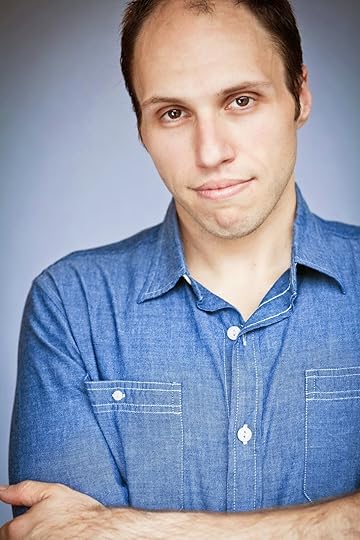
Larry Phillips
Hometown: Brick, NJ
Q: Tell me about your upcoming show:
A: "Learning to Skip" is a comedy that begins in a Kindergarten classroom. Jill, an Alpha Mom discover that her son Preston, might not be as perfect as she had hoped.
Feeling that a weakness in her child is more a poor reflection on her as a parent then on the actual child, Jill is mortified. This tiny flaw of Preston's sets off a chain of events that unravel the lives of his parents, his teacher, and her poor fiancé. As each of them tries to rebuild they all are forced to look their own flaws, and soon a battle for power, perfection, persistence, patience, and peanut butter overcomes them all. Did I mention it's a comedy!
Q: What else are you working on now?
A: I have 2 plays that are in the workshop phase that I hope to see productions of over the next year or so. "Arbuckle Syndrome" which is a look at Asperger's. And "Last Chance for Mama", which is Hollywood satire about getting
a TV show green lite.
Q: Tell me, if you will, a story from your childhood that explains who you are as a writer or as a person.
A: When I was in the 2nd grade, my teacher left half way through the year to adopt a baby. At the end of the school year, she came back one day to visit the class with the baby. For some reason, the class sang lullabies to the kid. After the third lullaby, I or reasons I do not know, shouted, "Geez kid, go to sleep already." It got a huge laugh from both kids and the adults in the room. It's my 1st conscious memory of what it was like to get a laugh...and I'm still chasing that feeling to this day.
Q: If you could change one thing about theater, what would it be?
A: It's not something I would change as much as something I would love to see more of: "Paying it Forward". When you find yourself in situation where you can help a playwright, a director, an actor, a designer find work, please do. On each show we try to bring someone in that we have worked with before and really liked. They may not be making a lot of money (or any) but each opportunity to work and meet new people is an open door. People have done it for me, and am forever grateful.
Q: Who are or were your theatrical heroes?
A: At 12 years-old I was introduced to work of Neil Simon and David Mamet, and I become obsessed with both of them. Two very different men, yet 2 playwrights who write in very specific rhythms. I am fascinated with rhythms; how people speak, how they write, how they sing. When I write I always think about each character and his/her rhythms of speech, and I have to think Mr. Simon and Mr. Mamet played a huge part in that education for me.
Q: What kind of theater excites you?
A: There isn't one specific type that excites me. My general rule is, just please don't bore me. I'm not saying everything has to be outlandish, or have twists and surprise endings. Just assume that your audience is as smart as you are. I get very restless at a show when I'm 2 steps ahead of what I'm watching.
Q: What advice do you have for playwrights just starting out?
A: Save everything you write and every now and then revisit it. I don't care if it's a entire play, a scene, or four lines of dialogue. You never know when something you wrote six years ago might trigger a new idea.
Q: Plugs, please:
A: "Learning to Skip" plays April 23rd-May 3rd at The Bridge Theatre in Shetler Studios. If you come and don't like the play, you may see me afterwards and I will give you your money back.
Tickets can be purchased at RandomlySpecificTheatre.com
-----------------------------------------------------------------------------------------------------------
Enter Your Email To Have New Blog Posts Sent To You
-------------------------------------------------------------------------------------------------------------
Support The Blog

-------------------------------------------------------------------------------------------------------------
Mailing list to be invited to Adam's events
Email:
--------------------------------------------------------------------------------------------------------------
Books by Adam (Amazon)
Adam's New Play Exchange Profile (Plays to Read)






Published on March 15, 2015 08:19
March 12, 2015
I Interview Playwrights Part 723: Nina Louise Morrison
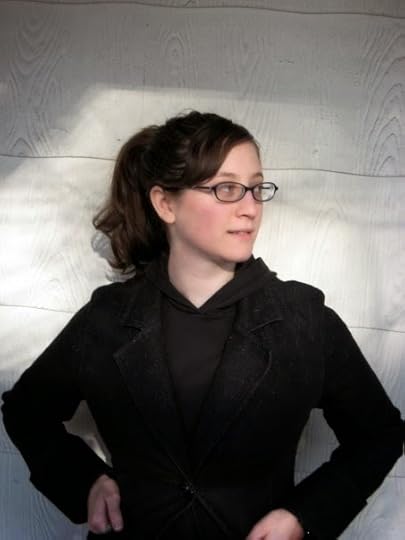
Nina Louise Morrison
Hometown: White Plains, NY
Current Town: Newburyport, MA
Q: What are you working on now?
A: I am devising a play with Project: Project about a folklorist who, while researching an obscure Grimm's Fairy Tale, falls Alice-like into the story of The Boy Who Went Forth To Learn How To Shiver. It's been such a fun process to work with my four brilliant collaborators; we improvise, visualize, physicalize, and invent new ways of working every time we meet. The Grimm's story is about a boy who can't feel fear, and our protagonist is a woman with a lot of fears – so we have done a lot of research and development around fear, work/creativity and gender, and unlocking your own creative mojo – and it’s a story about storytelling, so it’s pretty meta. It's been a total dream to get to work as an ensemble to devise this play for a year and a half. And there will be puppets! I'm also directing a play at Mount Ida College – Jonathan Rand’s Law & Order: Fairy Tale Unit. I have really been enjoying mentoring my team of enthusiastic assistant directors and stage managers there. I’m planning for the Mad Dash, a 24-hour play festival produced by Fresh Ink Theatre and Interim Writers. And I’m working on my own writing of course, but I’m at the beginning stages of a couple of things that are so early in the process I’m not ready to talk about them. But I’m writing every day, which is a new thing that has been really great.
Q: Tell me about the fellowship program at Huntington.
A: I go see all the productions, attend special events, and we meet every couple of weeks. The Huntington is a big institution, with big resources, the most important of which to me is the people – the fellows and the literary staff – they're all incredibly smart and also hilarious. It’s a really honest, challenging and supportive environment to be developing work. There are opportunities for readings and workshops, and many alums have had their work produced by the Huntington. But being produced by the Huntington isn’t the goal of the program - developing our writing is really the focus, and for me just being around productions on that scale is exciting. And my cohorts are incredibly brave, smart, and kind of on fire right now, so it’s totally inspiring to get to hang out with them and talk about writing. I just saw The Second Girl which had a gorgeous and incredibly detailed kitchen set with a working sink and the smell of cooking bacon wafting out into the audience. It’s always a little bit of a miracle to be able to sit in the audience and be reminded that new plays need not necessary be built for shoestring budgets. So I think the fellowship will push me to dream a little bit bigger and bolder.
Q: Tell me, if you will, a story from your childhood that explains who you are as a writer or as a person.
A: I was always performing as a kid, and I wanted to be an actor – my father was an acting teacher. I think I was about eight or nine and I saw some of my fathers’ students perform at the New Actors Workshop. I was so energized by the performers and the emotional risks they were taking - I particularly remember a man delivering a monologue sweating and spitting, you know, like really emoting. I have no idea what it was about, or whether he was good or bad, I probably didn’t know then either. But afterwards I stood alone on the stage in the dark in the red glow of the exit sign and kind of had a moment where I was like I want to be an actor, I want to take this seriously. And then I went home and wrote a poem about it! I recognize that moment now as not - aha, I want to be an actor - so much as aha, I want to be seen, and I want to be heard like that, I want to almost sing my feelings at that level - and then my actual method for doing that was to write about it. I think the writing impulse came because I identified with this male protagonist, but I wondered even then – where are the parts for women where they get to swear and sweat and spit? So it was as much as wanting to be seen and understood as it was about wanting to expand the possible narratives I could identify with – this complex mix of empathizing with the “other,” wanting to share some authentic self, and to be able to imagine myself as a woman with agency. I did end up training as an actor in college and at the National Theatre Institute, but as I was doing that I began to fall in love with cold reading new plays, so similar to the adrenaline rush of improvisation. Playwriting has become a method for both questioning existence and celebrating it at the same time. And it allows me to listen to and see others who are crying out to be heard and seen.
Q: If you could change one thing about theater, what would it be?
A: 5050 in 2020. http://theatrewomen.org/programs/5050-in-2020-parity-for-women-theatre-artists/
Playwrights can’t create in a vacuum - they need great collaborators in order to be great. And female writers have historically been excluded, marginalized and misunderstood, a fact I must acknowledge but not allow to hinder my own impulse to create. Because I do have hope – for my own career, and for the future. I believe strongly in the next generation of theatre makers, critics and leaders, and that the biases of previous generations will gradually fade out. I love teaching because my students want to know the why and how of everything – it means I can’t stay complacent – not in my teaching or in my writing practice.
Q: What advice do you have for playwrights just starting out?
A: Go to the theatre. Observe deeply, question everything, dream bigger than you think possible. Be proud of your rejections because it means you’re doing the work of putting yourself out there. And be good to people – to your collaborators of course, but also your family (that you make or are born into), and yourself. The same people who came to your shows and brought you flowers when you were young are the people who will be important supporters of you and your work when you are older. Develop your patience, let go of past failures, keep redefining your own success. Ask for what you need. Cultivate relationships with people you can trust to read your work and give you both encouragement and smart constructive feedback. Feed your curiosity; write about the things you wish you knew. Read everything out loud, including the stuff you scrawl in the margins that you think is nothing – keep listening to the stuff you write that you think is nonsense – you never know what it might be, it may be where something important and authentic lies hidden. Write towards the scary, ugly, lumpy stuff. Make up your own writing exercises. And definitely make your own list of advice just like this one: then try to live up to your own advice!
I wrote a blog for GrubStreet about the three things I can’t live without as a playwright. https://grubstreet.org/grub-daily/three-essential-ingredients-for-being-a-playwright/
Q: Plugs, please:
A: Project: Project's SHIVER will go up at Boston Playwrights Theatre in June, 2015! http://www.projectprojecttheatre.com
The Mad Dash https://24hpf.wordpress.com
More about Nina: http://ninalouisemorrison.wordpress.com
-----------------------------------------------------------------------------------------------------------
Enter Your Email To Have New Blog Posts Sent To You
-------------------------------------------------------------------------------------------------------------
Support The Blog

-------------------------------------------------------------------------------------------------------------
Mailing list to be invited to Adam's events
Email:
--------------------------------------------------------------------------------------------------------------
Books by Adam (Amazon)
Adam's New Play Exchange Profile (Plays to Read)






Published on March 12, 2015 10:37
March 4, 2015
I Interview Playwrights Part 722: Max Baker
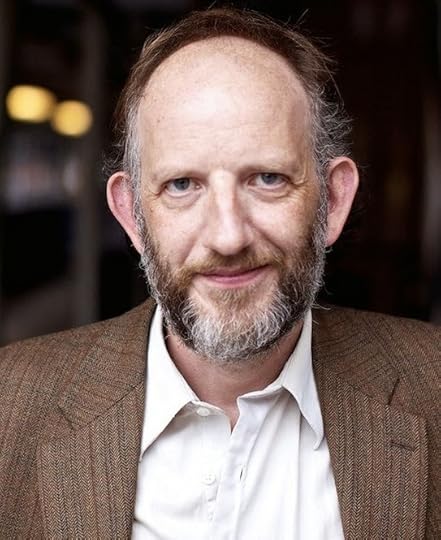
Max Baker
Hometown: London
Current Town: New York City
Q: Tell me about Live From the Surface of the Moon:
A: It's set in 1969 - the first act is the night of the moon landing, the second act is the last day of the decade.
Single set, six characters. Verbal abuse, group dynamics, electric can openers.Think Bill Cosby meets Revolutionary Road.
Q: Tell me about your band, Eelwax Jesus:
A: Excellent question! eelwax jesus have written some of the best songs you've never heard. I implore you to go to YouTube, type in YOU GET WHAT YOU PAY FOR (eelwax jesus) -
and experience the very tip of the eelwax iceberg.
Q: What else are you working on right now?
A: Oh gosh. I'm trying to crank-start a new play by diving into Conspiracy Theories -
They're such a great resource for writing: how to construct plausible, structured narratives from
random pieces of fact. It doesn't matter whether those narratives come from the paranoid, the lonely, the curious or the Government, there seems to be a strange trait in humans to seek out something we call The Truth - which really just means agreement. I find this interesting because if everyone really did agree on The Truth it might be great for us as a species, but it'd be pretty fucking dull for us individually. Okay, maybe I went on a little bit of a tangent. I'm working on a new play!
Q: Tell me, if you will, a story from your childhood that explains who you are as a writer or as a person.
A: One of my earliest memories (I must have been 4): my older brother had some kind of toy robot
with interchangeable hand devices which I thought was very sophisticated, and I am pretty sure I was told I wasn't allowed to play with it. For some reason I found myself alone in the front room with this robot and something compelled me to pick up one of the interchangeable pieces, a magnet, and put it in my mouth. I suppose that's what 4 year old's do - put things in their mouths. I heard my mother in the other room call my name, and promptly swallowed the magnet. Literally to this day, I can still conjure up the sensation of this lump of metal and plastic going down my throat. Later my brother was looking for the robot magnet-hand and obviously couldn't find it. I kept quiet. Not sure if that explains anything about me as a writer or a person, except I clearly discovered guilt and fear and how to lie about it all at the same time at an early age. I've had images of myself walking around life with spoons stuck to my stomach ever since.
Q: If you could change one thing about theater, what would it be?
A: The spelling. I like theatre spelled the British way.
Q: Who are or were your theatrical heroes?
A: This question makes my brain hurt.
Q: What kind of theater excites you?
A: The kind where people take off their clothes.
Q: What advice do you have for playwrights just starting out?
A: Stop watching TV.
Q: Plugs for your upcoming project(s):
A: Come see LIVE FROM THE SURFACE OF THE MOON at The Wild Project.
That way if you think I sound like a wanker in this interview, you'll have the chance to criticize my work.
-----------------------------------------------------------------------------------------------------------
Enter Your Email To Have New Blog Posts Sent To You
-------------------------------------------------------------------------------------------------------------
Support The Blog

-------------------------------------------------------------------------------------------------------------
Mailing list to be invited to Adam's events
Email:
--------------------------------------------------------------------------------------------------------------
Books by Adam (Amazon)
Adam's New Play Exchange Profile (Plays to Read)






Published on March 04, 2015 18:41

